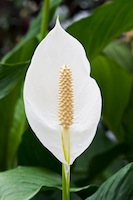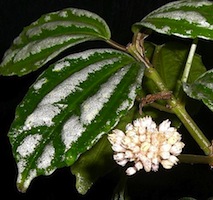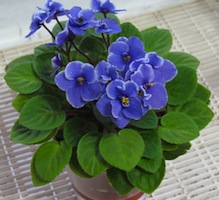- Mother’s Day Recipes You Can Make with Flowers - May 9, 2019
- Celebrating Flowers and Culture at the Shinnyo-en Lantern Floating Ceremony - March 29, 2018
- Give Easter Lilies This Spring - March 22, 2018
After all the hearts and flowers of Valentine’s Day have passed, February 20th offers the opportunity to celebrate the relationship you may have with a furry, four-legged friend on national “Love Your Pet” day. This odd holiday makes purr-fect sense to those of you who count animals among your favorite company and should be celebrated with some tasty treats and a good scratch behind the ears. If, along with being an animal lover, you also have a penchant for green plants, keep in mind that some houseplants may not mix well with cats or dogs. Take a look at the list below before heading to the florist or garden center to make sure your pets and potted plants live in harmony.
Toxic to dogs
Peace Lily (Spathiphyllum spp.) is one of the most common houseplants you see in homes. Large, long, glossy, green leaves sprout below tall stems of white, hood-like flowers. Easy to grow and tolerant of medium light, this one may already be one of your collection. Unfortunately, as a member of the Arum (Araceae) family, this plant produces a chemical compound similar to that found in human kidney stones that creates microscopic, extremely sharp crystals called raphides. When chewed and swallowed, they can cause swelling in the throat and mouth making it difficult for most mammals to breathe. Almost all plants within this family contain some levels of this toxin, including the popular arrowhead plants (Syngonium podophyllum) and Philodendron.
Try this instead….
American rubber plant (sometimes called baby rubber plant) is known by the Latin name Peperomia obstusifolia and is a great substitute. With rounded, glossy leaves that can sometimes be variegated, this plant will grow in similar conditions without harming your dog.
For something a little different, consider the aluminum plant (Pilea cadieri), whose interesting variegation almost looks like streaks of silver running down the leaves.
Toxic to cats
The spiky leaves of Dracaenas are very tempting to cats, who love to nibble on the ends of these sun-loving plants. While a few bits won’t hurt, the saponins in most species will cause vomiting and illness in cats. There are many members of the genus Dracaena that are common houseplants, including Cornplant Dracaena (Dracaena fragrans) and red-edge Dracaena. The bitter taste is a turn-off for most cats, but it’s hard to know the mind of a cat.
Try this instead…
African violets are cute and furry- much like your favorite feline- but wouldn’t hurt a flea. Their pretty purple flowers and rounded leaves will do great in a sunny window (if your cat is willing to share).








